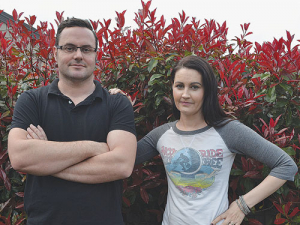DairyNZ and Beef + Lamb NZ wrap up M. bovis compensation support after $161M in claims
Compensation assistance for farmers impacted by Mycoplama bovis is being wound up.
 Rangiora Jersey breeders Peter and Claire Hansen have been denied compensation after they were blocked from importing four cows from Australia because of the M.bovis outbreak. MPI says the case did not meet the compensation criteria detailed in the Biosecurity Act.
Rangiora Jersey breeders Peter and Claire Hansen have been denied compensation after they were blocked from importing four cows from Australia because of the M.bovis outbreak. MPI says the case did not meet the compensation criteria detailed in the Biosecurity Act.
Jersey breeder Peter Hansen has asked his local MP for help as he continues to seek compensation after being caught up in the Mycoplasma bovis outbreak.
Hansen last year bought four Jersey cows from an Australian stud, but MPI denied an import licence on the grounds that live imports were a possible pathway for the disease. MPI later declined his claim for compensation.
Hansen, who runs the Lilac Grove Stud at Fernside, Rangiora, says he has not given up the fight.
“I sent several emails to [Agriculture Minister] Damien O’Connor’s office. They promised to reply but I’ve heard nothing so I went to our local Member of Parliament Matt Doocey, meeting with him about three or four weeks ago. He’s written an official letter to them asking what’s going on, but we haven’t heard anything back.”
Hansen says he may next seek legal advice.
“I’d like people to know that [O’Connor’s] office hasn’t been getting back to me. They’re not doing right by someone like me. I mean, as far as I know I’m the only one [declined] compensation. You’d think it might be worth a bit of contact from the Minister of Agriculture, wouldn’t it?”
A spokesperson for the minister’s office said he was unable to comment on individual cases.
It is believed Hansen’s cows would have been the first live cattle imported in about four years.
He claimed about $350,000 compensation, mostly for the estimated cost of having the four cows flushed for embryos, which he believes was justified to put him in a similar position to what he would have been in had the animals been allowed into the country.
MPI says compensation is only paid for verifiable losses as a result of MPI exercising its powers under the Biosecurity Act for the purpose of control or eradication of an organism.
“None of these powers was exercised on Mr Hansen. According to the act, compensation must not be paid if the person’s loss relates to uncleared goods,” it says.
Meanwhile, Hansen believes the M.bovis response was “a knee-jerk reaction to a disease that the rest of the world’s got”.
“I could understand if it were foot and mouth; I’d want them to be going as hard as they could on it because that’s such a devastating disease,” he told Rural News.
“It would be lovely if they could get rid of it, but unless you’re checking all the lifestyle farms and all the beef farms and all the dairy grazing farms how can you be confident you haven’t just killed the portion of the industry that you know about?”
Norwood has announced the opening of a new Tasman dealership at Richmond near Nelson next month.
Buying or building a rural or semi-rural property? Make sure you know where the wastewater goes, says Environment Canterbury.
With collars on more than seven million cows worldwide, Nedap says its standalone launch into New Zealand represents world-leading, reliable and proven smart technology solutions for dairy farmers.
The Meat Industry Association (MIA) is once again looking for game-changing ideas for New Zealand's red meat processing and exporting sector.
Environment Southland is inviting feedback on two bylaws that play a critical role in safeguarding the region's waterways and ensuring the safety of the local community.
While the North Island is inundated with rain, Southland is facing receding water levels as warm weather and lack of rainfall continues.